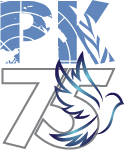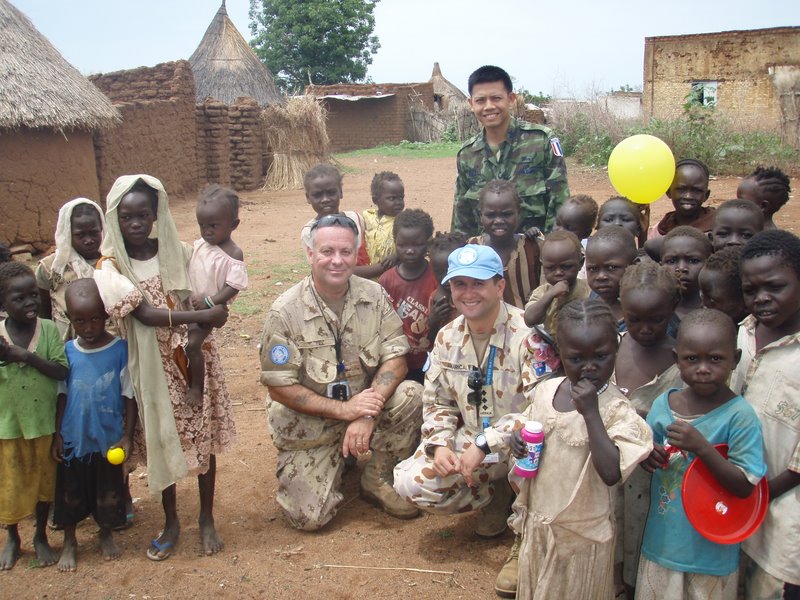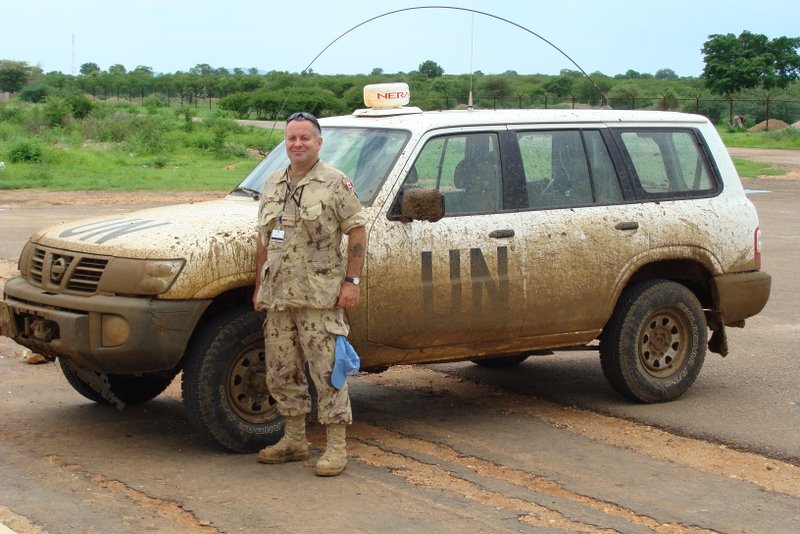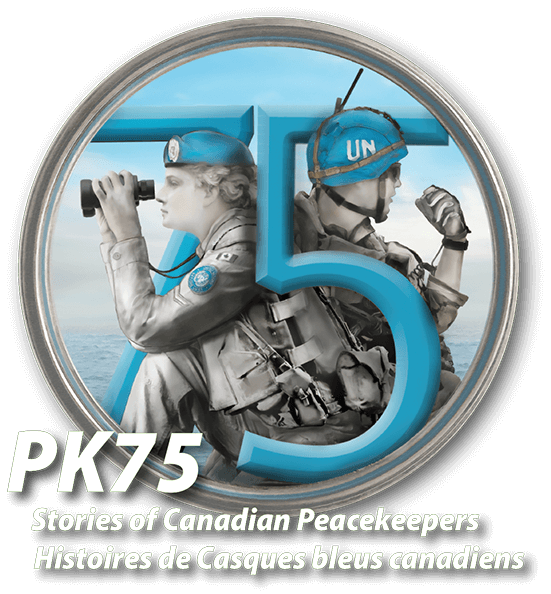

In 2009 I deployed to the Sudan, Africa, for a six-month tour, serving as one of the United Nations Military Observers (UNMO) who are the proverbial “eyes and ears” of a UN mission. We are “unarmed” peacekeepers, an approach intended to convey a presence of neutrality. I had been on previous deployments, but this was my first mission being unarmed, and it took some getting used to. While flying to Khartoum, the capital of Sudan, our plane had to be turned back to Beirut, Lebanon for an overnight stay due to a massive sandstorm at our destination that made it too dangerous to land in Khartoum. It was my first experience with a “Haboob” the Arabic name for such storms, and they are as ferocious as any snowstorm.
I deployed to Kadugli, a remote village nestled in the foothills of the Nuba mountains. Kadugli looked like a town from the old West, replete with rutted dirt roads, overcrowded markets, and livestock everywhere. Our team site consisted of UNMOs from many nations including Nepal, India, Pakistan, Egypt, South Korea, Uganda, and Australia. During downtime, I taught them how to play “Pass the Ace” a game that grew to be a tremendous hit with the UNMOs. Part of our daily ritual was to proceed into Kadugli to the local baker for “Dinka bread” which was a staple with most meals. I got to experience eating goat and camel meat, the latter being very tough and chewy.
A major part of our mission pertained to the Disarmament, Demobilization and Reintegration (DDR) process whereby members of the former combatants would lay down their weapons, leave their military units, and return to civilian life. We were responsible to monitor the collection and control of weapons, as well as their disposal. It was an eye-opener to witness the combatants turning in weapons, as they ranged in ages from child to adult. Though most places we patrolled were safe, due to the volatile nature of other locations, ensuring our safety necessitated an armed security detail provided by members of the Egyptian UN forces.
Part of the role of being an UNMO was to patrol through the various villages and interact with the inhabitants. I delivered numerous gifts of toys, sandals, candy, etc. that were sent to me from family and friends. This helped in winning “hearts and minds” within the communities. Most of the villages consisted of small mud and thatch roofed houses called “Tukuls.” They live a truly spartan lifestyle. In one instance I had provided a young child with a frisbee. My interpreter had to explain to the villagers what a frisbee was, as most thought it was a dinner plate. Children are children everywhere, so you could just imagine the sheer joy of receiving candy, jump ropes, Dollar store sandals, etc. They were very appreciative.
My favorite village was a leprosy colony located in South Murta. I had befriended a Dutch nurse from the leprosy mission who put me in contact with a representative of the village. The villagers were extremely welcoming and hospitable. With the help of a Dutch UNMO we collected monies to purchase mosquito nets for the tukuls, as well as plastic tarps to cover the roofs. We also purchased farming tools to assist with their harvesting of sorghum. Malaria is rampant in the Sudan, so the mosquito nets were most welcomed.
Being an UNMO was an honour. I’m fortunate to have a loving wife and family, and their support to me, while deployed, was a real morale booster. My care packages were received and enjoyed by all the UNMOs. The Sudan was my favorite tour of duty, and I cherish memories from my time there.
Biography
I served in the Canadian Armed Forces for 38 years. For the first 28 of those, I served as a Senior Non-Commissioned Member (NCM) and was commissioned to the rank of Captain in 2008. My role as an NCM was a Resource Management Support Clerk (RMS Clk), and as a Captain I was an Army Logistics Officer (Log O).
The RMS Clk profession is known as a “purple” trade meaning that you can serve in all elements — Army, Navy, and Air Force. My first posting was onboard HMCS NIPIGON. During my time onboard I had the opportunity to deploy on a six-month Standing Naval Force Atlantic (STANAVFORLANT) tour, sailing with a multi-national force. While serving onboard, in 1982, I was involved in a severe storm at sea that sank the oil rig, Ocean Ranger, off the coast of Newfoundland. All 84 crew members aboard the Ocean Ranger were lost.
I spent four years onboard ship and then, in 1984, was posted to Canadian Forces Base Lahr, West Germany to serve with the 1st Royal Canadian Horse Artillery (1 RCHA) where I was one of two Naval service members serving with the Regiment. Transferring from a naval environment to a field unit was somewhat of a culture shock but I thoroughly enjoyed both postings. While serving with the Navy, I had travelled to various countries, and while stationed with the Army in Germany, my family and I were also able to visit numerous countries.
In 1988, I was posted to Canadian Forces Base Uplands (Ottawa). I missed serving in an operational environment, so I was subsequently posted to the Canadian Airborne Regiment (CAR) in Petawawa, ON. With the downsizing of the Regiment the following year I was transferred to 2 Service Battalion (2 Svc Bn), a service support unit, also in Petawawa. In 1994, I deployed with the Battalion to Croatia, part of the former Yugoslavia. It was my first deployment as a United Nations peacekeeper. I was later posted to a Naval Reserve unit in PEI following my deployment, and a year later I was posted to Canadian Forces Base Halifax where I remained for the next 10 years. While in Halifax, I got to serve again onboard HMC Ships CHARLOTTETOWN and TORONTO.
Following these postings, I served with two reserve Brigade units, one in Moncton and the other in Halifax. My final posting was to National Defence Headquarters in Ottawa where I was a staff officer with Strategic Joint Staff (SJS). Upon retirement in 2018, my wife and I moved to Cambridge, NS in the Annapolis Valley where we enjoy spending time with our children and grandchildren. During my lengthy career I participated in the following UN and NATO missions:
- Standing Naval Force Atlantic (STANAVFORLANT), 1983;
- United Nations Protection Force (UNPROFOR), Croatia, 1994;
- United Nations Disengagement Force (UNDOF), Golan Heights, 2000-2001 (1 year tour);
- International Security Assistance Force (ISAF), Afghanistan, 2004;
- United Nations Mission in Sudan (UNMIS), Sudan, 2009; and
- Canadian Contribution to the Training Mission in Afghanistan (CCTM(A)), Afghanistan, 2012.

My wife, family, and friends sent numerous gifts and candy for the children.

Some patrol areas were remote and inhospitable.


